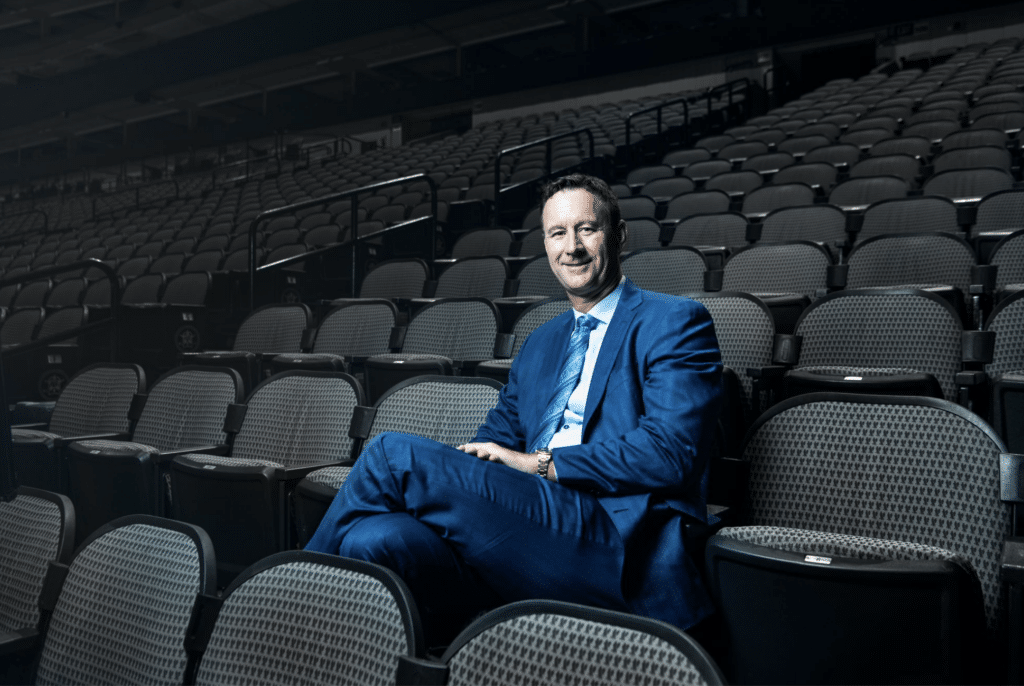The Business of College Athletics: A Conversation with Conference USA Commissioner Judy MacLeod

Pioneering Commissioner of Conference USA
When Judy MacLeod became the third commissioner of Conference USA in 2015, her appointment was historic: She is the first and only female commissioner of a Football Bowl Subdivision athletics conference. She came to the Dallas-headquartered conference in 2005 after 15 years at the University of Tulsa, including 10 as athletics director. We talked to MacLeod about her backstory, the financial side of collegiate athletics, and what’s exciting at the four Texas schools representing Conference USA.
Texas CEO Magazine: Your career began in athletics and you’re still there. Did you know at an early age that you wanted to be in the business?
MacLeod: I did not. I played basketball in college and actually was planning on going into the finance industry. I didn’t even realize I could have this kind of a career. I got offered an assistant coaching job right out of college and I thought, “If I ever want to do it, I should try it now.”
I decided to get into administration when I took a job with the Goodwill Games in Seattle. I ran a couple of sports in the 1990 Goodwill Games. When I tell young people that now, they look at me like I have two heads. “What’s a Goodwill Game?” I’m like, “Oh, I am old, aren’t I?”
After that, I had to make a decision: Do I want to pursue coaching or administration? I thought I might be better suited for administration. So I decided to go back to grad school and moved to Oklahoma for a graduate assistantship at the University of Tulsa.
Texas CEO Magazine: A little change there from Seattle. Had you ever even been to Tulsa?
MacLeod: No. My friends and family might’ve thought I’d lost it, but I was like, “It’s two years. You can do anything for two years.” After a year, they hired me full-time. I was still finishing up my master’s. Five years after I arrived, I became the athletics director. People are like, “This isn’t a real story.” And sometimes it doesn’t even sound real when I tell it, but it happens.
Texas CEO Magazine: So you were young and inexperienced when you took that job. Tulsa’s not a Division III school. They could have done a nationwide search. Why do you think they took a chance on a young person?
MacLeod: A lot of it was the circumstances. They made me interim AD first. When they later hired Dr. Bob Lawless from Texas Tech [as university president] and introduced me to him as interim AD, he probably looked at me like, “Are you kidding me?” And to his credit, he spent about 10 months evaluating me. Those 10 months under Dr. Lawless, every day was a test. And I guess I eventually passed.
When he offered me the job, I thought, “Well, I’m already doing it. Tons of people work their whole careers to be an AD. Why would I not?” So, I took it. He was the best boss I could ever ask for. Just incredibly supportive, helped me grow so much. I consider him and his wife friends to this day. It’s unbelievable, really, to get that opportunity at 31 years old.
Texas CEO Magazine: The AD position has some similarities to the CEO role, but it’s not the highest paid or most well-known position, especially compared to some of the coaches. How did that work?
MacLeod: Honestly, that dynamic was perfectly fine for me and my personality. I would prefer to not be the one in the spotlight. It’s about the young men and women who are putting in the work, and the coaches. Those are the people who deserve the recognition.
As an AD I’m there to lead, but also to serve those people and give our coaches what they need to do their jobs and create a great experience for the student-athletes. It was never an issue. Obviously, I had coaches and administrators who were older than me, who made more money than me, but we were all pulling on the same rope. The more basketball was excelling at Tulsa during those times, and the more credit they got, the better I was, as far as I’m concerned.
Texas CEO Magazine: There’s a certain challenge to not being the preeminent, best-known university in a particular state or region. How did you deal with that?
MacLeod: Tulsa is a small private school. Within a two-hour drive, we had Oklahoma, Oklahoma State, and Arkansas. There were more alums from those places in the city of Tulsa than from University of Tulsa. It was always a challenge, but we did our best to be Tulsa’s team. We said, “It’s great if you’re an Oklahoma State fan, but if you live in Tulsa, and Oklahoma State’s not playing Tulsa, we need you to be a Tulsa fan.”
The success obviously helped. We finally got football going. We’d been to a couple Sweet Sixteens and an Elite Eight in men’s basketball. So things were moving pretty well, but it was still a challenge. We didn’t even have the challenge we do today, where people can watch every game on TV from their couch.
Texas CEO Magazine: How does the revenue break out at smaller schools—not just at Tulsa but in Conference USA overall?
MacLeod: All of our schools’ athletic programs receive funding from their university, whether it’s an allocation or driven by student fees. That’s one of the misconceptions, that there’s so much money flowing. Our schools do not bring in enough revenue to support their expenses, so they’re subsidized by our universities. That’s a choice the institutions have made, because athletics are important and bring many things to campus—alumni engagement, publicity, exposure. But it’s not like there’s so much money that we don’t know what to build next.
Texas CEO Magazine: Or that you have all this money to pay every student-athlete a living wage. How do you see that issue developing?
MacLeod: For a long time we’ve all said, “This is too hard. How would it work?” And it is hard, but that can’t be the excuse not to try to figure it out. Whatever we do, it’s got to be uniform. We can’t have different laws in different states. We need guidelines. We’re working on it diligently—I say “we” because the NCAA is a membership organization. I can’t tell you that the answers are easy or that everyone’s going to like them, but it’s something we have to figure out. We have to move with the culture and the modernization of things.
Texas CEO Magazine: For a while in college athletics, it felt like you had to get the new list of who’s in the conference every year. For the last three or four years, it seems like we’ve steadied. Do you see that staying in place, or is there going to be another big upheaval?
MacLeod: I do think things have stabilized. In some of the larger conferences, the individual schools have signed over television rights and other media contracts. With that stabilized at the top, it’s a domino thing. It eventually affects everyone, though I would never say it’s never going to happen again.
For some of us, high school and college sports were a big part of growing up. Now many kids would rather play Fortnite than go to a football or basketball game. Are we going to see video gaming within the NCAA umbrella down the road? They’ve talked about it and studied it for a while. We’ve talked about it within our conference. We haven’t gotten to that point of having a league championship in esports. I don’t know if it fits under an NCAA umbrella or not. But I definitely think it’s not going away. It’s remarkable, some of the facilities that have been built for esports.
Texas CEO Magazine: You’ve got four Texas schools representing Conference USA—North Texas, Rice, UTSA, UTEP. What are the exciting things happening at those schools?
MacLeod: The overarching thing I would say is the leadership at all four schools. From the presidents to the ADs, they’ve been very aggressive in marketing and improving things.
All four of them have exciting things going. North Texas has gone through an explosion of growth with their football facility and indoor practice facility, used by football, track, softball, soccer, and other sports when there’s inclement weather. Their women’s soccer team won their third consecutive conference tournament championship and play in a brand new soccer stadium, and they recently announced a new golf facility.
At Rice, especially on their women’s side, they’ve had tremendous success. Last year, their women’s basketball team went undefeated in the league and captured both the regular season and conference tournament championships, and participated in the NCAA tournament. And they should be very good again. Their volleyball team is nationally ranked, defeated Texas in the regular season, and participated in the NCAA tournament. Under second-year head coach Mike Bloomgren, the football program showed dramatic improvement this season. The football team was one of only seven programs to be honored by the AFCA for recording a perfect APR for 2017–18. The men’s basketball program is in its third year under Scott Pera and is currently 6–3 with some good wins in the early going.
At UTSA, their AD is in her second year and doing some great things down there. Their football program is still relatively young, but there’s tremendous potential if they can get it going. The interest is there. When they first started football, they had quite a few people coming to the Alamodome, and it was a great atmosphere. They were picked second in the preseason poll for men’s basketball. Steve Henson’s done a really nice job. They’ve got a couple of players who are on our preseason all-conference team. They recently hired a new baseball coach in Patrick Hallmark, who brings an excellent pedigree to their program.
UTEP’s still rebuilding in football, but they are another team that’s continuing to play hard. They have a brand new president and a fairly new AD and are continuing to upgrade their facilities. I would watch out for their men’s basketball team. Coach [Rodney] Terry is in his second year and they’ve already had wins against New Mexico State and New Mexico, both of whom were very highly regarded going into the season. I think we’re going to see some noise from them on the men’s basketball side.
Texas CEO Magazine: Conference USA seems to have an advantage when it comes to the game-day experience. When you go see a UT football game, it’s a daylong commitment, with getting there and parking and all that. Your fans’ ability to park right at the stadium, sit in a good seat, without a lot of fanfare—that’s appealing to people, right?
MacLeod: Our ADs have made a concerted effort to think about the experience, from the time somebody leaves their house to when they return to their house—how do we make it the easiest and best? Granted, we’re not dealing with 100,000 people, so inherently it’s going to be easier.
But we still work to make it a great experience, and you are going to see a good football or basketball game, because we have really talented young men and women in our programs. So you can have a great experience at our games for a less expensive price and with more convenience.
Texas CEO Magazine: Figuring out where all your schools go during bowl season has to be one of the most challenging duties you have. How does that process work?
MacLeod: That’s one of the more interesting processes we go through. It doesn’t change day to day—it changes every five minutes, from one phone call to the next. We’ve been really successful though. Last year, Conference USA won the trophy for the highest winning percentage in bowls. The year before last, we had 10 bowl-eligible teams and were fortunate enough to find places for nine of them. I wish we could have found 10, but the system is constrained. There’s a limit.
We work with our bowl partners. We talk with our ADs. At the end of the day, it’s really the bowl’s choice. But number one, we try to create match-ups that are appealing. If we have a 10–2 team, we don’t want to match them up with a 6–6 team.
We also work really hard to make the games make sense geographically. Now, that’s not going to happen 100 percent of the time. But we’ve done a really nice job of having bowls in great locations. We play in Hawaii sometimes. We play in the Bahamas every year. We play in Florida, obviously, in the Metroplex. It’s just a puzzle, putting it all together.
You can’t make 100 percent of teams or fans happy, but we try to do the best we can. I think our coaches and ADs realize that any bowl is a good bowl. You get to spend extra time with your kids, and your fan base and community gets excited.
Texas CEO Magazine: Conference USA is making moves locally with the conference basketball tournament here in Texas at The Star in Frisco for the third consecutive year. How has that helped your league’s profile? Please give us some insight on how y’all are approaching this event.
MacLeod: We partnered with the City of Frisco, Visit Frisco, the Dallas Cowboys and Baylor Scott & White to bring one of our premier events to Frisco. We have four days of tremendous basketball with 12 men’s and 12 women’s teams competing for an automatic bid to the NCAA tournament.
The unique setting, playing two games under one roof simultaneously, the Fan Fest we have created on the plaza, and the surrounding restaurants, hotels, and retail have combined for a great experience not only for our teams, but also for the fans.
Similar to what we talked about earlier, you don’t have to be an alum or affiliated with one of our schools to come out and enjoy high-level college basketball in a family-friendly environment at an economical price. With the help of our local vendors, corporate sponsors and the other contributors already mentioned, we have created a great tournament atmosphere, while delivering substantial economic impact back to the surrounding area.






The Sport of Relocation
January 14, 2020